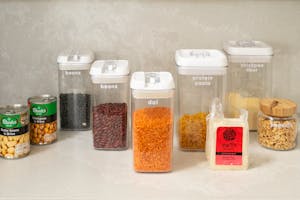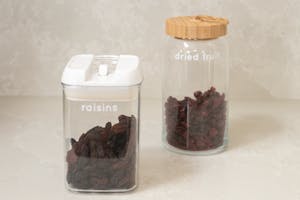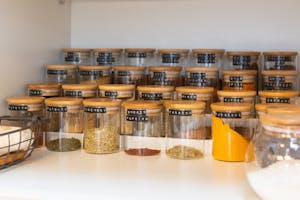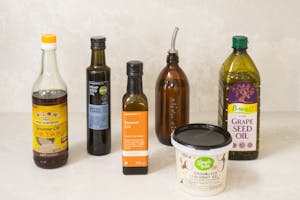Stocking your vegan kitchen with the right ingredients is the key to creating delicious, nutritious, and varied meals. Whether you’re starting from scratch in a new home or looking to enhance your existing pantry, this guide will walk you through the essential vegan staples to keep on hand in your pantry, fridge, and freezer.

With these ingredients, you’ll be prepared to whip up a wide array of plant-based meals that are not only satisfying but also packed with essential nutrients. To make this comprehensive list easier to navigate, I’ve broken it down into 14 categories. Remember, you don’t need every item on this list; choose a few favorites from each category and build a stash of staple foods that suit your tastes and cooking habits.
Table of Contents
cursive = stored in the fridge
bold = stored in the freezer
1. Legumes And Legume Products

Legumes are the cornerstone of a vegan diet, providing a primary source of protein, fiber, and essential amino acids. They’re budget-friendly, versatile, and can be used in countless dishes. Whether you’re making a comforting lentil soup, a hearty bean chili, or a flavorful hummus, legumes should be a staple in your kitchen.
Examples:
- Beans (kidney, navy, pinto, black, lima, adzuki, mung, black gram, etc.)
- Lentils (red, green, brown, etc.)
- Chickpeas
- Garden peas
- Edamame
- Tofu and tempeh
- Legume-based products like hummus, soy mince / textured vegetable protein, and vegan meat substitutes, legume flours, legume pasta, etc.
Why They Matter: Legumes are a powerhouse of nutrition, offering high protein content and essential vitamins and minerals. They’re also incredibly versatile, lending themselves to both savory and sweet dishes.
2. Grains And Grain Products

Grains are a vital component of a balanced vegan diet, providing energy, fiber, and various nutrients like iron, zinc, and B vitamins. From breakfast oats to dinner quinoa bowls, grains are a staple you’ll reach for daily.
Examples:
- Rice (basmati, jasmine, brown)
- Oats (steel-cut, rolled, instant)
- Quinoa*
- Pearl barley, millet, amaranth
- Grain flour (wheat, barley, rye, spelt, rice, buckwheat, teff, etc.)
- Pasta and noodles
- Bread and tortillas
*Quinoa is technically a seed, but is culinarily used in the same way as grains.
Why They Matter: Grains offer a great source of energy and can be used in a wide variety of dishes. They’re also a good source of fiber, which is important for digestive health.
3. Nuts

Nuts are nutritional powerhouses, rich in healthy fats, protein, and various vitamins and minerals. They’re perfect for snacking, adding to meals, or making your own nut butters.
Examples:
- Almonds, cashews, and walnuts
- Pecan nuts, pistachios, and Brazil nuts
- Nut butters (peanut butter, almond butter)
- Coconut (shredded, fresh, or as coconut milk/cream)
Why They Matter: Nuts add richness and depth to both sweet and savory dishes, and their high-fat content makes them particularly satiating.
4. Seeds

Seeds are another fantastic source of nutrients, particularly omega-3 fatty acids, fiber, and protein. Storing them in the fridge can help extend their shelf life and maintain their nutritional value.
Examples:
- Flaxseeds and chia seeds
- Pumpkin seeds and sunflower seeds
- Hemp seeds and sesame seeds (including tahini)
Why They Matter: Seeds are easy to incorporate into meals, whether sprinkled on top of salads, mixed into smoothies, or baked into bread. Their nutritional benefits make them a staple in any vegan kitchen.
5. Dried Fruit

Dried fruits are a convenient and tasty way to satisfy your sweet tooth while also getting a boost of vitamins and minerals. They’re perfect for snacking, adding to breakfasts, or incorporating into baking.
Examples:
- Raisins, cranberries, and goji berries
- Dates, figs, and prunes
- Dried mango, apricot, and apple slices
Why They Matter: Dried fruits are not only delicious but also packed with nutrients like fiber, iron, and antioxidants, making them a healthy addition to your pantry.
6. Non-Dairy Products
Non-dairy products are essential in a vegan kitchen, replacing traditional dairy in almost every application. From milk alternatives to vegan cheeses, these products help you enjoy your favorite dishes without compromise.
Examples:
- Non-dairy milk (soy, cashew, oat)
- Vegan buttery spread and margarine
- Non-dairy yogurt (coconut, soy, cashew)
- Vegan cheese and cream cheese
Why They Matter: Non-dairy products ensure that you can enjoy creamy, rich textures in your meals while sticking to a plant-based diet. They also often come fortified with important nutrients like calcium and vitamin D.
7. Vegetables
Vegetables are, of course, a key component of any vegan diet. However, it’s easy to rely too heavily on processed foods. Make sure to incorporate a wide variety of fresh veggies into your meals to maximize your nutrient intake.
Examples:
- Leafy greens (kale, collard greens, spinach, cabbage, beet greens, Swiss chard, watercress, all types of lettuce, etc.)
- Cruciferous vegetables (broccoli, cauliflower, Brussels sprouts, radish, etc.)
- Root vegetables (potato, sweet potato, parsnips, carrots, rutabaga, turnips, etc.)
- Allium vegetables (onion, garlic, leeks, scallion, shallot, chives, etc.)
- Stems/ stalks (asparagus, celery, fennel, fiddle head, etc.)
- Vegetables that are technically fruits (all types of squash and pumpkin, bell peppers, cucumber, tomato, avocado, olives, etc.)
- Mushrooms*
*Mushrooms are technically a fungus.
Why They Matter: Vegetables provide essential vitamins, minerals, and fiber, which are crucial for maintaining overall health. They also add vibrant colors and flavors to your dishes.
8. Fruit
Fruits are another essential part of a balanced vegan diet, offering natural sweetness, hydration, and a range of vitamins and antioxidants.
Examples:
- Apples, pears, and grapes
- Citrus fruits (oranges, grapefruit, lemons, limes, pomelo, mandarins, etc.)
- Stone fruits (peaches, nectarines, apricots, plums, cherries)
- Berries (strawberries, raspberries, blueberries, blackberries, cranberries, currants, etc.)
- Tropical (bananas, mangoes, papayas, pineapple, coconut, kiwi, passion fruit, guava, lychees, rambutan, star fruit, pitaya (aka dragon fruit), jackfruit, etc.)
- Melons (watermelon, cantaloupe, honeydew, etc.)
Why They Matter: Fruits are a delicious way to satisfy sweet cravings while also getting a healthy dose of nutrients like vitamin C, potassium, and fiber.
9. Sweeteners
While most refined sugars aren’t vegan due to the use of bone char in processing, there are plenty of plant-based sweeteners to choose from.
Examples:
- Raw cane sugar, coconut sugar
- Pure maple syrup, agave nectar
- Date syrup, molasses
Why They Matter: These sweeteners allow you to enjoy sweet treats without compromising your vegan principles, and many of them come with added nutritional benefits.
10. Herbs And Spices

Herbs and spices are the key to making plant-based meals flavorful and exciting. Stocking a variety of these will ensure you can always whip up something delicious.
Examples:
- Basil, thyme, oregano, and parsley
- Cumin, coriander, turmeric, and paprika
- Nutritional yeast! (for a cheesy flavor)
- Cinnamon, nutmeg, and cloves
Why They Matter: Herbs and spices add depth and complexity to your meals, turning simple ingredients into gourmet dishes.
11. Oils

Oils are essential for cooking and flavoring your meals. Each type of oil has its own unique properties and flavor, making it important to stock a few different kinds.
Examples:
- Extra virgin olive oil
- Coconut oil
- Grapeseed oil
- Sesame oil (toasted and unrefined)
- Avocado oil
- Peanut oil
- Hemp oil
Why They Matter: Oils help in cooking, enhancing flavors, and even in baking. They’re also a source of healthy fats, which are necessary for a balanced diet.
12. Vinegars

Vinegars are essential in a vegan kitchen for both cooking and baking. They’re often used for their leavening and flavor-enhancing properties.
Examples:
Why They Matter: Vinegars add acidity and complexity to your dishes and play a crucial role in vegan baking by helping to leaven and flavor your baked goods.
13. Condiments
Condiments can take your meals from good to great, adding that extra bit of flavor that makes a dish sing.
Examples:
- Vegan mayonnaise, ketchup, mustard
- Soy sauce, tamari, sriracha
- Barbecue sauce, hot sauce, salad dressings
Why They Matter: Condiments are an easy way to enhance the flavor of your meals, making them more enjoyable and satisfying.
14. Other
There are a few other essentials that you’ll want to keep in your vegan kitchen to make sure you’re always ready to cook something delicious.
Examples:
- Coffee and tea
- Bouillon cubes or vegetable stock
- Canned tomatoes and coconut milk
Why They Matter: These items round out your pantry, ensuring you have all the basics needed to create flavorful and nutritious meals at any time.
Final Thoughts
By stocking your kitchen with these vegan staples, you’ll be well on your way to maintaining a balanced, nutritious, and delicious plant-based diet. Remember, it’s not about having every item on this list; instead, focus on building a collection of ingredients that work for you and your cooking style. With these staples at your fingertips, you’ll be able to create a wide variety of meals that will keep you and your loved ones satisfied and healthy.
Don’t forget to leave a comment below if you found this guide helpful or if you have any vegan staple suggestions of your own!
Love, Lien x
